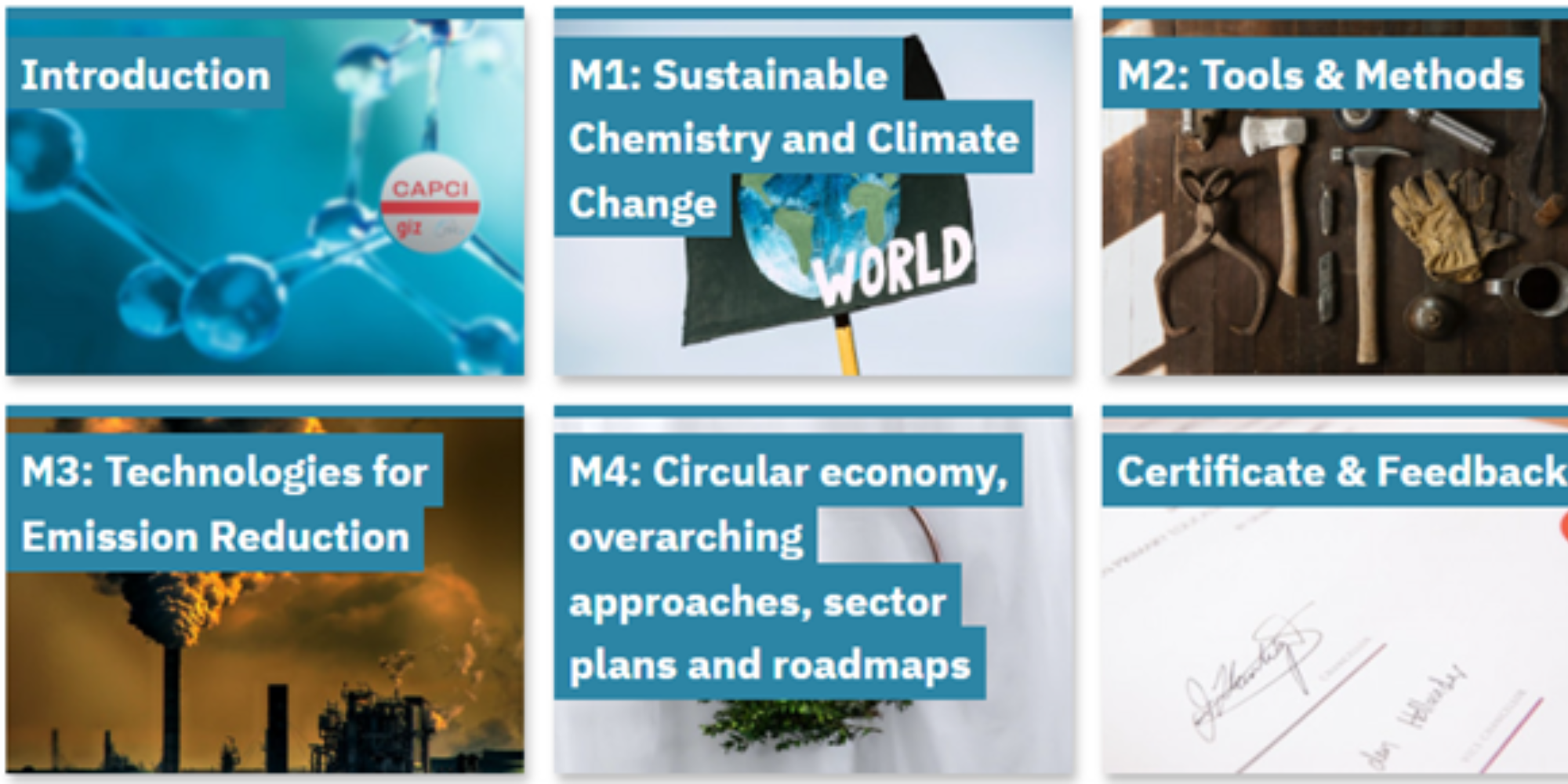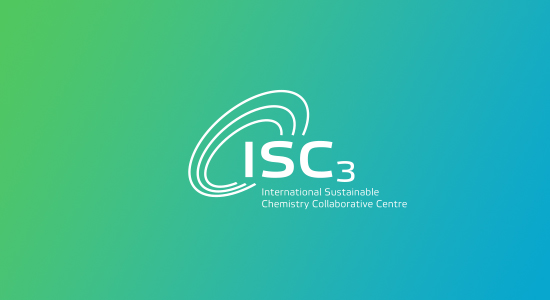Factsheets
Sustainable Chemistry for Climate Protection - Capacity Development as a Key to Effective Climate Action in the Chemical Sector
With their capacity development programmes, CAPCI and ISC3 want to enable people and partners to take positive action in the field of climate protection and Sustainable Chemistry.
The chemical sector is a major player when it comes to tackling climate change and achieving the objectives of the Paris Agreement. While the chemical and petrochemical industries account for up to 10% of the world’s final energy demand, it is also an important source of low-carbon solutions and materials needed for the energy transition.
Check out the factsheet on “Sustainable Chemistry for Climate Protection” to learn more on how we increase awareness and knowledge about the climate impacts of the use of chemicals across the globe!
The Verbund in Chemical Parks: Promoting net-zero targets in the chemical industry
In Germany, the chemical industry mostly operates within the confines of chemical parks. Over 1,000 companies currently have operations in one of Germany‘s roughly 60 chemical parks, which employed around 250,000 people in 2021.
With its roadmap for promoting efforts to mitigate climatechange, the German chemical industry has set an inten-tion to reduce overall GHG emissions and become carbonneutral by 2050. This objective can, however, only beachieved if targeted measures are effectively implementedat the chemical parks themselves.
The “Climate Action Programme for Chemical Industry (CAPCI)” and its Partners
The Climate Action Programme for the Chemical Industry (CAPCI) and its partners present their main learning experiences providing an overview on the strong linkages between chemistry and climate change. This publication seeks to inform and inspire the readers on the big potentials of the chemical industry for implementing GHG mitigation measures and contributing to tackle climate change.
Sustainable Chemistry for Climate Protection
The chemical industry sector is not only a fundamental cornerstone of modern life as well as global and national economies: More than 90 percent of the manufacturing industry depends on products from the chemical industry. The chemical and petrochemical industries account for around 10% of the world´s final energy demand and 7,4% of the global greenhouse gas emissions (IPCC, 2022), when considering emissions directly controlled by companies (scope 1) as well as those associated with purchased electricity, heat, steam or cooling (scope 2). At the same time, the chemical industry is a source of innovations and materials that are crucial for the roll-out of future-oriented low-carbon technologies. In this context climate change represents a key challenge for a future-oriented transformation of the whole sector towards a “sustainable chemistry”. Check out the factsheet on “Sustainable Chemistry for Climate Protection” to learn more about facts and figures about sustainable chemistry and climate protection.
CAPCI Dialogue Paper: How to Enhance Climate Protection in the Production and Use of Chemicals – with a Focus on Developing Countries and Emerging Economies?
The Dialogue Paper “Climate Protection in the Production and Use of Chemicals – Learning Experiences and Recommendations Concerning Developing Countries and Emerging Economies” was co-developed by CAPCI and a group of international experts. It highlights the interlinkages between sustainable chemicals management and climate change in the production and use of chemicals, particularly in developing countries and emerging economies. It includes the learning experiences of the Climate Action Programme for the Chemical Industry (CAPCI), written comments from cooperating experts and the results of an online workshop, held on 23 August 2023 with representatives from public and private sector, academia and civil society organisations from selected partner countries as well international institutions and cooperation projects. The key messages of these discussions were presented and discussed in a side event at the 5th Session of the International Conference on Chemicals Management (ICCM5) that took place from 25 to 29 September 2023 in Bonn and brought important results such as the Global Framework for Chemicals – For a Planet Free of Harm from Chemicals and Waste. The present dialogue paper is in line with the ICCM5 and its approach to find coherent approaches for tackling the triple crisis of climate change, biodiversity loss and pollution. It specifically addresses the interlinkages between sustainable management of chemicals and climate change. The main outcomes of the expert discussions held beforehand and at the ICCM5 together with comments and suggestions received in its aftermaths are summarizes in 12 key recommendations.
Factsheet Green Ammonia
According to the Sixth Assesment Report by the Intergovernmental Panel on Climate Change (IPCC 2022), the chemical and petrochemical industry is responsible for 7.4% of global greenhouse gas (GHG) emissions and 10% of the global final energy demand. The sector shows distinct growth, and its emissions also continue to rise.
Carbon Capture & Utilisation
According to estimations by the Intergovernmental Panel on Climate Change (IPCC), global warming is expected to exceed 1.5°C between 2030 and 2050 if global greenhouse gas emissions are not significantly reduced. As carbon dioxide (CO2) is the primary greenhouse gas, efforts not only for reducing its emissions but also for removing it from exhaust gases and the atmosphere are increasingly important.
Green Methanol
Methanol is a widely used solvent, energy source and raw material for the chemical industry. It is an organic chemical, which is colourless, flammable and toxic. Methanol can be mixed in various ratios with water and many organic solvents. Inorganic salts can also be dissolved in methanol. Along with ammonia, propylene, and ethylene, methanol is one of the most widely produced basic chemicals in the world. Methanol is used in a variety of applications, including fuel and fuel additives, wastewater denitrification, chemical feedstock, and hydrogen carrier.
Lessons Learnt and Experiences from Cooperation with Developing Countries and Emerging Economies
The implementation of CAPCI has yielded broad and valuable learning experiences that are summarized in this factsheet. Some of the learning experiences are more general in nature while others refer to the intense cooperation with CAPCI partner countries, Argentina, Ghana, Peru, Thailand and Vietnam.
Factsheet on roadmaps for climate protection in the production and use of chemicals.
As an important pillar of CAPCI’s work on chemistry and climate change, the project has supported the elaboration of roadmap proposals in Argentina, Ghana, and Thailand that are briefly presented in this new factsheet. These roadmaps proved to be a valuable tool for shaping viable transformation pathways for the chemical industry towards climate protection and sometimes complete decarbonization, while striving for enhanced competitiveness and improvements in the areas of sustainable chemicals management, circular economy as well as energy and resource efficiency. In all 3 cases, the roadmap development was accompanied by a public-private stakeholder dialogue and involvement of academia or specialized technical institutions. One of the lessons learnt is that there are no blueprints: Roadmaps must be individually designed according to the specific demand and situation in the country and in the sector.
For further information see also our new factsheet on “lessons learnt” and the presentation on CAPCI results and learning experiences.
Presentation Results & Learning Experiences
Presentation on State of the Art, Results and Lessons Learnt.






